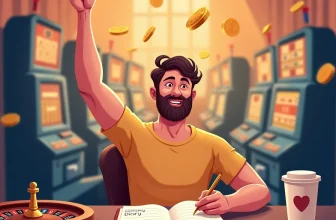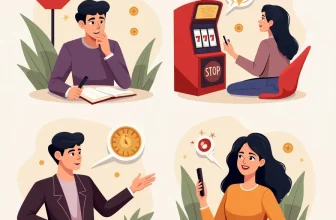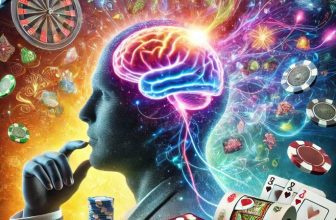"Well, just one spin and there it is, good luck! What could possibly go wrong?"
Gambling is often perceived as a fun pastime: went to the casino with friends, spin slots, bet on sports, and relax. But sometimes a harmless hobby grows into a real problemthat affects the psyche, relationships, and even financial well-being. How does it happen? Why do some players lose control, while others continue to enjoy the game without consequences? And most importantly - how not to fall into the trap of ludomania? This is what we are going to talk about today.
So make yourselves comfortable: we're going to go through the psychology of gamblingdiscuss "ludomania control." and give practical advice to those who feel that excitement is beginning to rule their lives.
Content
Gambling: the fine line between fun and addiction
Why do we love to play so much?
At the heart of gambling is. anticipation of reward. Our brains love surprises and novelty. Every time we place a bet, we're gonna get "dopamine injection."because we're hoping to win. This same hormone, dopamine, is responsible for pleasure and motivation. The game becomes a kind of "reinforcement" that keeps us coming back again and again.
Where does the line go?
A hobby turns into a problem when gambling starts to prevail in our lives. Here are a few signs that may indicate that a situation is getting out of control:
- Constant thoughts of bets and the next game.
- An inability to stop, even when feeling tired or short of money.
- Trying to "get even" after losses.
- Problems in relationships, work or studies due to a fascination with games.
If you notice any of these things in yourself or a loved one, it's a wake-up call.
A little sarcasm
Sometimes it seems that casinos are created specifically to "pull" all the money out of us, but in fact they just provide an opportunity. "Honest" such an opportunity: come, lose, and then come back for a new loss. Isn't that great? But let's not completely blame the casino - we can make decisions too.
Psychological aspects of gambling
The "near-win" effect
Have you noticed how sometimes almost identical symbols fall out on a slot, but there is literally one missing to make the score? The brain perceives it as "almost won."which encourages us to keep playing. It's basically cheating, but the brain doesn't see the difference. It thinks, "I was so close to success!"
The illusion of control
Many players truly believe that they can influence the outcome by using some sort of "magical" rituals or strategies. It's called "the illusion of control.". For example, throwing dice with a certain strength or saying "secret words" to make the machine "bring" the winnings. But the reality is that most gambling is pure math and randomness.
Player Error (Gambler's Error)
When we see a single outcome (e.g., "red" in roulette) occur several times in a row, it seems that the next time will "definitely be black". In fact, the odds do not change from the previous results, but the brain tries hard to find patterns where there are none.
Chasing losses
Losing causes us stress и desire to regain. This is the reason why people can't stop when a series of failures haunt them. We try to "win back", which often leads to more losses. After all, gambling is not about rationality, but about emotions.
When does a hobby turn into an addiction?
Definition of ludomania
Ludomania (pathological gambling addiction) is a condition in which a person cannot control his or her gambling addiction, continues to gamble despite negative consequences, and experiences "withdrawal." without another dose of adrenaline. Simply put, it is the same addiction as to drugs or alcohol, only the object is gambling.
How do you distinguish between ordinary gambling and addiction?
- Financial problems: you take out loans, borrow money from friends to keep playing.
- Relationship problems: relatives complain that you don't spend enough time with them, and all you talk about is betting and winning.
- Emotional swingsfrom euphoria to despair in a short period of time.
- Trying to hide your game: you lie about money lost or time spent in the game.
If you notice anything on this list, you should be wary.
Humor with a bitter flavor
"It's okay if I lost my entire paycheck, but I had fun," is what people usually say when trying to justify themselves. But in reality. self-deception. The fun ends when you realize there's no money for the next week, not even for food.
Psychologists' tips: how to control gambling
Set limits
This is probably the easiest and most effective way. Determine for yourself how much money you are willing to spend on the game (and lose!) without sacrificing your life. Set a limit and never exceed it. The same applies to time: do not stay in the casino or betting more than planned.
Keep a diary
Write down how much money you spent and how much you won. Often people forget about losses and remember only wins. The diary will help you objectively assess whether you are really "on the plus" or whether it is just an illusion.
Avoid "magical thinking."
Do not try to "talk" the machine or "negotiate" with roulette. Betting is math, not magic. Even if sometimes it seems that you have found the secret of success, most often it is just chance.
Control your emotions
When you win, it's easy to get euphoric and start raising the stakes. When you lose, you want to win back and risk even more. Both extremes lead to disaster. Try to keep serenitytake a break and analyze the situation with a cool head.
Seek support
If you feel that gambling is getting out of control, talk to friends, family or seek professional help. Psychologists who specialize in gambling addiction can help you understand the causes and find a way out of the situation. Do not hesitate to ask for help - it is not a sign of weakness, but a reasonable step.
Practical examples and real stories
The story of Lucky Sergei
Sergey was an ordinary guy who liked to bet on soccer. One day he won a large sum, guessed the outcome of several matches in an express and got 10 times more than he had bet. It seemed to be a success, but it was the beginning of problems for him. He started betting more and more often, ignoring analysis and statistics, hoping for another "miracle". In the end, he lost all his savings. He realized that he was addicted only when his relatives said: "Either we bet or we do". Sergei went to a psychologist, underwent a course of therapy and learned to control his gambling and keep detailed records of his bets.
The story of the Roulette Queen
Anna was a woman who was convinced that roulette was her "specialty". She studied "secret strategies", believed in "hot" and "cold" numbers, and lined the table with chips, hoping to "cheat the system". At some point she started taking out loans and got into debt. Only after seeing a psychologist and participating in a support group did she realize that it was all self-deception. She managed to cope with her addiction and now she gambles rarely and only token amounts.
The conclusion of the stories
In both cases, people thought they were "special" and could get around the rules of math and statistics. But reality showed the opposite. The main thing is to stop in time and realize that excitement can be stronger than us if we don't keep it under control.
What should you do if you already sense a problem?
Recognize the problem
The first step to a solution is acceptance. If you see that gambling has begun to take up too much space in your life, don't deny it. The sooner you recognize the problem, the easier it will be to solve.
Restrict access
Try it block casino sites on your computer or phone, delete betting apps, ask loved ones to keep control of your bank cards. This may be a temporary measure, but it will help you take a break and rethink the situation.
Find an alternative
If gambling has become the main source of adrenaline and emotions, think about what else you can fill your life with. Sports, creativity, traveling - any hobbies that give a charge of positive emotions without the risk of financial loss.
See a specialist
A professional psychologist or psychotherapist specializing in gambling addiction can help understand the causes and offer strategies for breaking the cycle. Don't be afraid to seek help - it's normal.
"Gambling and psychology": a glimpse into the future (2025)
In 2025, the gambling industry has become even more technologically advanced. Online casinos offer VR slots, betting shops are implementing AI to analyze matches, and social media is abuzz with betting advertisements. In this environment, it is especially important to supervise your hobby:
- Apps for self-restraint: there are already programs that help you set betting limits and playing times.
- "Smart" recognition systems: some platforms implement algorithms that can detect signs of ludomania and offer help to the player.
- Information resources: more and more sites dedicated to the "psychology of gambling" and "controlling gambling addiction" are appearing on the Internet. You can find addiction tests, articles, videos and even online support groups.
But for all this technological advancement, the main thing remains human beings. It is up to us to decide how to utilize these opportunities and whether we want to protect ourselves from negative consequences.
Humor and sarcasm that can help
Sometimes irony helps to put things into perspective. If you feel that gambling has become too addictive, you can apply the "detachment method": imagine that your "gambling personality" is a comic character who whispers, "Bet it all, you're going to get lucky! Think about whether you want this "joker" to run your life.
- Joke of the day"I win, I'm a genius! I lost, that means the machine is broken. That's good logic, isn't it?"
- Sarcastic advice: "If you can't control the excitement, you can, of course, sell all your possessions and go to Las Vegas to "deal" with the casino personally. Just don't forget to come back to reality."
Brief conclusions and practical recommendations
- Gambling can be a harmless hobby, but can easily turn into an addiction if left unchecked.
- Psychology plays a key role: the effects of "almost winning", the illusion of control, player error and the desire to win back all lead to loss of money and problems in life.
- Signs of addiction: constant thoughts of betting, financial difficulties, trying to hide the game from loved ones, emotional swings.
- Control: set limits on money and time, keep a diary, avoid magical thinking, learn to manage your emotions, seek professional help when necessary.
- FutureIn 2025, the gambling industry will be even more "advanced", which requires even more self-control and awareness.
Conclusion: is gambling a friend or foe?
Gambling is a twofold thing. On the one hand, it is a source of adrenaline and vivid emotions. On the other hand, if used incorrectly, it can cause serious problems. As one famous psychologist said: "Everything is good in moderation. If you feel that gambling has begun to control you, take action - do not let it dictate the conditions of your life.
I hope this article has helped you take a look at the "gambling and psychology" from a new angle. And remember, the most important thing is not be afraid to come clean to yourself that you have a problem (if there really is one), and feel free ask for help. The game should remain a game, not become the meaning of life or a way to destroy your financial stability.
Let your excitement always be under control, and winnings - a pleasant bonus, not a goal at any cost!





